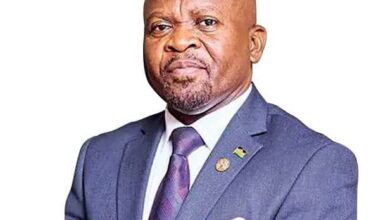News
Lawyer and human rights advocate Alexius Kamangila calls for accountability at the ACB

By Burnett Munthali
In a bold and provocative statement, prominent lawyer and human rights advocate Alexius Kamangila recently took to his Facebook page to express his growing concerns about the actions of the Anti-Corruption Bureau (ACB) in Malawi. In a post that has sparked significant discussion and debate, Kamangila questioned the effectiveness of the ACB in addressing corruption, calling for accountability not only from those implicated in corrupt practices but also from the officials tasked with fighting corruption

.
Kamangila’s post, which has garnered widespread attention, poses a critical question: “ACB, what are you doing?” His remarks reflect a sense of frustration among many Malawians who have witnessed a series of high-profile corruption cases that have seemingly gone unresolved. He went further to suggest that ACB officials themselves may need to be scrutinized, stating, “I think we should arrest ACB officials kukupitaku,” which translates to “I think we should arrest ACB officials in your presence.”
This strong language indicates a growing impatience among citizens regarding the perceived inaction of the ACB. Kamangila’s comments resonate with those who believe that the bureau has not done enough to hold powerful figures accountable for corrupt practices, leading to a loss of public trust in its ability to effectively combat corruption.
The Anti-Corruption Bureau was established to investigate and prevent corruption in Malawi, a country that has struggled with governance issues and a lack of transparency. While the ACB has made some strides in prosecuting cases of corruption, there are ongoing concerns about its capacity and commitment to effectively tackle the pervasive culture of impunity.
Kamangila’s criticisms come at a time when the Malawian public is increasingly aware of the importance of integrity in governance. Citizens are demanding greater accountability and transparency from public officials, including those in anti-corruption agencies. The call for arresting ACB officials reflects a deep-seated belief that all parties involved in corruption, whether perpetrators or enforcers, should face scrutiny and potential consequences for their actions.
Kamangila’s remarks are significant as they highlight the complex dynamics surrounding the fight against corruption in Malawi. They raise essential questions about the effectiveness of existing institutions and the need for reforms that strengthen accountability mechanisms.
His post has encouraged discussions on social media, prompting citizens to express their own frustrations and opinions regarding the ACB and its role in addressing corruption. The public’s growing engagement in these discussions signifies a demand for action and a commitment to fostering a culture of accountability in governance.
As a lawyer and human rights advocate, Alexius Kamangila’s voice adds to the growing chorus of Malawians calling for accountability and effective action in the fight against corruption. His bold assertions challenge not only the ACB but also the entire governance system to do better.
Ultimately, Kamangila’s statement serves as a reminder that combating corruption requires vigilance, transparency, and the collective effort of citizens and institutions alike. The call for accountability within the ACB underscores the need for reform and a commitment to ensuring that all officials, regardless of their position, are held accountable for their actions. The discourse initiated by Kamangila’s post could be a catalyst for much-needed change in Malawi’s ongoing battle against corruption.







